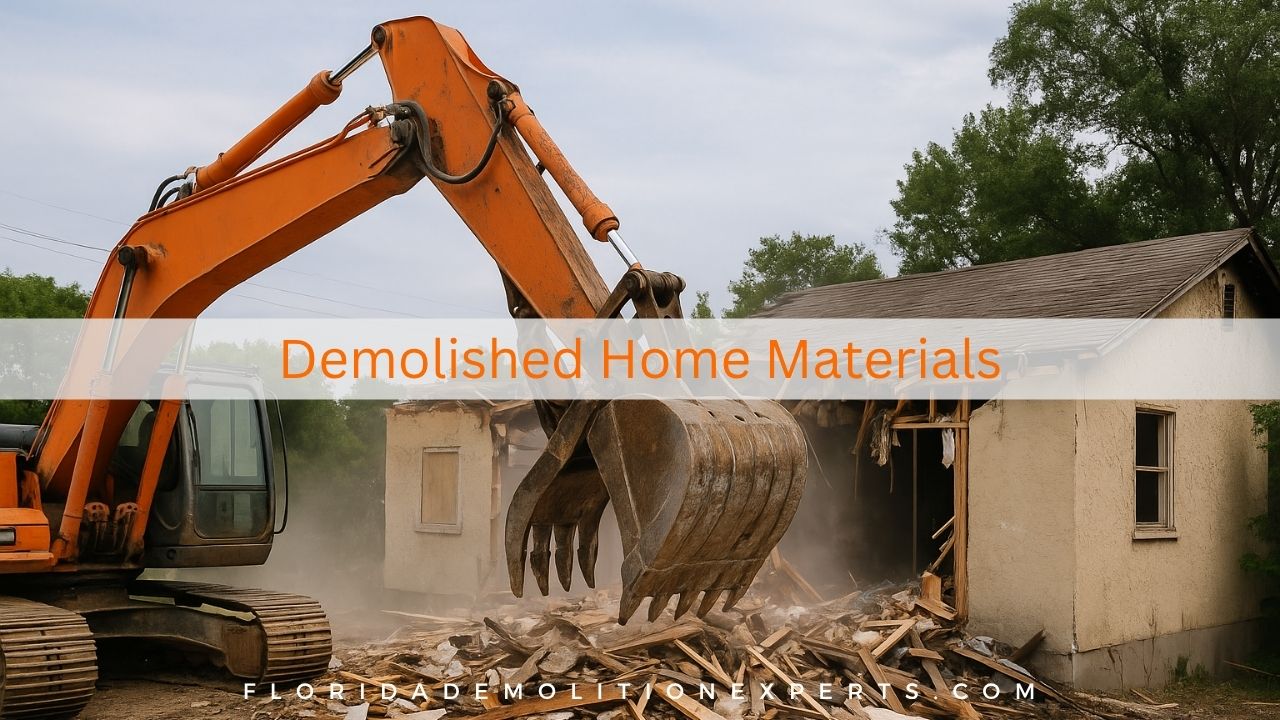Have you ever driven past a demolition site and thought, “What happens to all those materials? Are they just thrown away?” The answer might surprise you. Many materials from a demolished home can be reused, recycled, or even sold for profit. Instead of wasting valuable resources, smart homeowners are finding ways to turn rubble into revenue.
In this guide, we’ll explore what you can salvage, where to sell it, how to plan, and why working with professional demolition contractors in Florida makes all the difference.
Why Consider Reusing Demolition Materials?
1. Save Money on Future Projects
Reclaimed wood, flooring, and fixtures can significantly reduce costs when renovating, rebuilding, or even starting new DIY projects. Why pay full price at the hardware store when you own materials with character and strength?
2. Unlock Resale Value
Architectural salvage is a booming market. Items like antique doors, reclaimed wood beams, or vintage light fixtures often sell for two to three times the cost of standard materials. Many buyers actively seek these items for custom home builds and restorations.
3. Protect the Environment
Millions of tons of demolition waste are disposed of yearly in U.S. landfills. Recycling and reusing materials means less landfill waste, lower carbon emissions, and conservation of natural resources. If sustainability matters to you, material reuse is a powerful step.
What Materials Can Be Reused or Sold?
Not everything from a demolished home is destined for the dumpster. Here are the top categories:
Not everything from a demolished home is destined for the dumpster. Here are the top categories:
- Wood & Lumber: Framing timber, hardwood flooring, and ceiling beams are durable and perfect for resale or reuse.
- Bricks and Concrete: Whole bricks can be cleaned and resold, and broken concrete can be crushed and repurposed as aggregate.
- Windows & Doors: Vintage wooden windows and solid-core doors are popular among remodelers.
- Cabinetry & Fixtures: Kitchen cabinets, sinks, countertops, and bathtubs can be easily resold or donated.
- Roofing Materials: Slate tiles, clay roofing, and even newer shingles may have resale potential.
- Metal Components: Copper wiring, aluminum siding, and steel beams fetch strong prices at scrap yards.
- Appliances: Working stoves, refrigerators, and HVAC units are valuable on the secondhand market.
The Difference Between Demolition and Deconstruction
Most people think demolition means smashing everything down with heavy machinery. While that’s one approach, deconstruction is a smarter option if you want to reuse or sell materials.
- Traditional Demolition: Fast but destructive, leaving most materials unsalvageable.
- Deconstruction: A careful, selective process that dismantles the home piece by piece, allowing maximum recovery of valuable items.
Although deconstruction can take longer, the financial and environmental payoffs are worth it.
How to Maximize Value From Demolition
Plan With Your Contractor
Before the first wall comes down, discuss which materials can be preserved with your demolition contractor. A clear plan ensures nothing valuable is destroyed.
Sort and Store Safely
Organize materials into wood, metal, fixtures, and concrete categories. Store them properly to prevent damage and facilitate resale.
Connect With Buyers
Some top places to sell reclaimed materials include:
- Local salvage yards
- Online platforms (Facebook Marketplace, Craigslist, eBay)
- Specialized marketplaces like Habitat for Humanity’s ReStores
- Builders and remodelers who prefer reclaimed goods
Work With Professionals
Professional demolition experts know which materials hold the most resale value and how to extract them safely. DIY salvage can be risky without the right equipment and expertise.
Legal and Safety Considerations
Before you start salvaging, remember:
- Permits: Some municipalities in Florida require specific permits for demolition and material removal.
- Asbestos & Hazardous Materials: Homes built before the 1980s may contain asbestos, lead paint, or other hazards. Professional handling is essential.
- Liability: Improperly handled salvage can lead to accidents. Ensure you’re working with insured contractors.
Tax Benefits of Donating Materials
If you don’t want to sell, consider donating salvageable materials to non-profits. Many organizations provide tax-deductible receipts for donated items, which can offset your costs. This approach benefits both your finances and your community.
You Need Demolition
Ready to start your demolition project? Contact Florida Demolition Experts today for safe, efficient, eco-friendly demolition services tailored to your needs.






